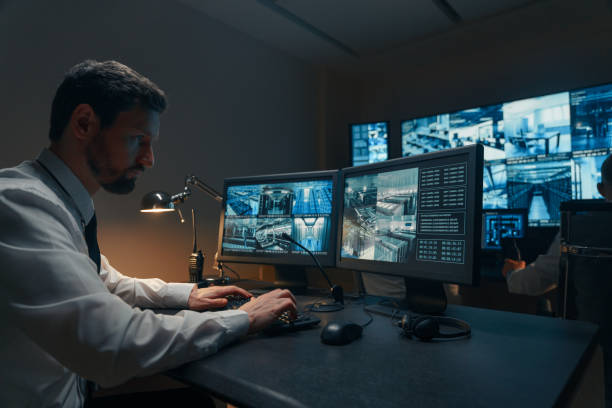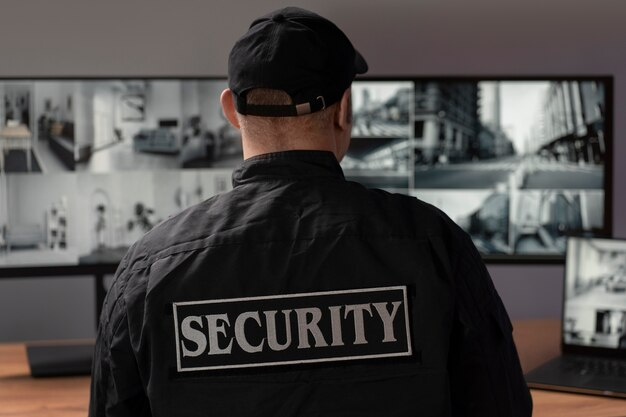Factory security is protecting your factory from unauthorized access and theft. It begins with ensuring that all factory areas are properly secured, including entrances, exits, and storage areas. Then, you must develop a security policy and implement it throughout the factory. You must also train employees to identify and report potential security threats. This article will discuss the different types of factory security and the measures you can take to ensure that your factory is secure.
What are the Different Types of Factory Security?
Factory security is important to protect your business against potential threats. There are a variety of types of factory security, and you need to choose the type that best suits your needs.
1. Physical Security:
This includes measures like locks on doors and windows, surveillance cameras, and personnel screening.
2. Data Security:
Protecting your company’s data includes ensuring it is protected from unauthorized access, destruction, or theft. Measures may include encrypting data and installing security software.
3. Environmental Security:
Factory security encompasses protecting both the building and its surroundings from fire, natural disasters, and terrorism. Measures may include installing alarms and sprinklers, training staff in emergency response procedures, and conducting septic inspections.
4. Operational Security:
This includes measures to safeguard your factory from potential terrorist threats and cyberattacks. These measures may include restricting access to certain areas of the factory, installing locks on equipment, and requiring employees to use secure passwords and ID cards.
How do Factory Security Systems Work?
Factory security systems are designed to protect workers, equipment, and the factory itself from theft or vandalism. Various security measures are typically in place, including locks on doors, cameras and sensors to monitor activity, and secure communication systems. Factory security systems can be customized to meet the specific needs of a given facility.
What Are The Benefits Of Having A Factory Security System?
Factory security systems can offer some benefits to businesses. Not only do they help protect valuable assets, but they can also help deter crime and maintain a safe work environment. Here are four key benefits about why businesses should consider installing a factory security system:
- Protect Assets: A factory security system can help protect valuable assets from theft or This includes items such as equipment, inventory, and intellectual property.
- Deter Crime: It can help deter crime in the workplace. This includes criminals who may attempt to steal or damage property and employees who may commit acts of vandalism or
- Maintain a Safe Work Environment: A factory security system can help maintain a safe work environment for employees. This includes preventing accidents and ensuring that workers are aware of safety
- Meet Standards: A factory security system must meet certain standards in order to be approved by the government. This means that it is reliable and effective at protecting business
How to Choose the Right Factory Security System for Your Business?
Factory security is an important part of ensuring the safety of your business. The right system can help protect your assets, employees, and customers. Here are some factors to consider when choosing a factory security system:
1. Purpose of the System
The first step in choosing a factory security system is determining the purpose of the system. Do you need to protect your assets from theft or vandalism? Or do you need to prevent unauthorized access to your factory?
2. Facility Size and Layout
After determining the purpose of the system, you must consider the size and layout of your factory. Large factories may require multiple systems to cover all areas, while smaller businesses may be able to use one system that covers most areas.
3. Types of Security Systems Available
Several types of security systems are available, each with its own benefits and drawbacks. Below are three of the most popular types of systems:
-Alarm Systems:
Alarm systems send alerts through a phone or horn when something is detected, such as a door being opened or someone entering the factory without authorization. Alarms can be set to trigger at certain times (such as during shift changes) or based on certain conditions (such as when the temperature drops below a certain threshold).
-Security Cameras:
Security cameras can be used to monitor areas of the factory, including areas that are off-limits to employees. The footage can be stored on a hard drive for later playback or automatically sent to a monitoring centre for analysis.
-Radar Systems:
A radar system uses electromagnetic waves to detect objects and people in the vicinity. This system is popular for large factories because it is less likely to have a false alarm and is more accurate than other types of security systems.
4. Installation and Operation Requirements
Depending on your type of security system, you may need specific installation and operating requirements. For example, alarm systems usually require an electrical outlet near the installation site, while video surveillance requires a cable connection to a central monitoring station.
5. Cost and Maintenance Costs
Cost is one of the most important factors when choosing a factory security system. Each type of system has its costs associated with installation and maintenance, as well as monthly fees for monitoring services. It is important to compare the costs of different systems before deciding.
Frequently Asked Question
Here are some of the Frequently Asked Question related to the Factory Security:
1.What is a factory security guard?
A factory security guard is a professional who works in factories to protect the workers and equipment. They monitor the area, stop unauthorized entry, and respond to accidents.
Factory security guards are usually trained in self-defense and first aid. They also carry firearms if necessary.
The job of a factory security guard can be dangerous, but it is a good way to make money and learn about safety in the workplace.
2. What are 3 examples of a security system?
A security system is a set of measures designed to protect a company’s assets from unauthorized access or theft. There are many different types of security systems, and each has its specific features and benefits.
Some common security systems businesses use include video surveillance, intruder alarms, and locked doors. Each of these systems has its unique benefits and drawbacks.
- Video surveillance can be a great way to protect a business’s assets from theft or However, it can also be a costly investment.
- Intruder alarms are often the cheapest option, but they don’t always provide accurate warning signals.
- Locked doors can be effective in protecting a business’s assets from theft, but they can also be a deterrent to customer.
3. How does factory security work?
Factory security is critical to maintaining factory workers’ safety and security. There are a number of ways to secure a factory, but the most important aspect is the installation and use of effective security systems.
Security at a factory can be divided into two main categories:
1. Perimeter security
Perimeter security refers to the physical measures taken to protect the factory from unauthorized entry. These measures might include fences, guard towers, and cameras.
2. Internal security.
Internal security refers to the measures taken to protect the workers within the factory. These might include locks on doors, passwords for computer access, and identification cards for employees.
There are a number of different types of security systems available for factories. The most common systems are CCTV (closed-circuit television), intrusion detection systems, and alarm systems. Each system has its own advantages and disadvantages.
CCTV is often considered to be the most effective type of security system because it can capture footage of any unauthorized entry or activity in the facility. However, CCTV systems can be expensive to install and maintain, and they can be easily hacked. In contrast, intrusion detection systems alert staff when someone enters the facility without authorization, but they do not provide footage of the intruder.
4. Why do factories have security?
Factories have security to protect workers, equipment, and property from theft or vandalism. Some common measures used in factory security include employee identification, secure entrances and exits, alarm systems, and surveillance cameras.
5. What is industrial security?
Industrial security protects industrial plants, equipment and personnel from unauthorized access, theft and sabotage. Industrial security aims to ensure the safety and security of people, property and the environment. Industrial security encompasses a broad range of activities, from patrolling and monitoring facilities to installing and maintaining security systems.
6. How to Protect Your Factory from Thieves?
There is no doubt that factory security is important. Thieves are constantly looking for ways to steal merchandise, and factories are a prime target. To protect your factory from theft, follow these tips.
- Install CCTV cameras in high-traffic areas. This will give you a clear image of what is going on in the
- Establish a secure perimeter around the factory. This will help keep thieves out and protect your valuable merchandise from being
- Require employees to wear identification badges at all times. This will help you trace any stolen merchandise back to its rightful
- Keep track of employee movements throughout the day. This will help you identify any suspicious activity in
Factory security is an important part of any business. Protecting your workers, equipment, and valuable assets from theft or damage is essential to keeping your business running smoothly. We can summed it up with four tips for creating a successful factory security policy:
- Establish clear boundaries around where employees can and cannot
- Install surveillance cameras in sensitive areas, such as the production
- Make sure you have up-to-date security measures in places, such as alarm systems and locks on doors.
- Train employees on identifying and reporting potential threats, no matter how small they may




